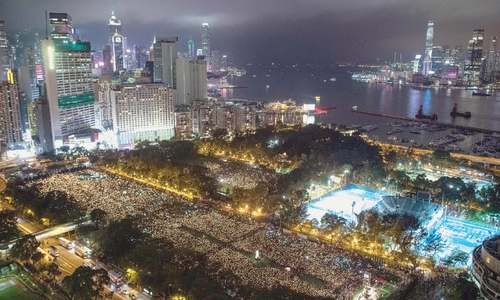HONG KONG: Hong Kong leader Carrie Lam on Saturday delayed indefinitely a proposed law that would allow extraditions to mainland China, in a dramatic retreat after widespread anger over the bill sparked the biggest street protests in three decades.
The extradition bill, which would cover Hong Kong’s 7 million residents as well as foreign and Chinese nationals in the city, was seen by many as a threat to the rule of law in the former British colony.
Around a million people marched through Hong Kong last Sunday to oppose the bill, according to protest organisers, the largest since protests in the city against the bloody suppression of pro-democracy demonstrations centred around Beijing’s Tiananmen Square on June 4, 1989.
Demonstrations continued through the week and were met with tear gas, bean bag rounds and rubber bullets from police, plunging the city into turmoil and piling heavy pressure on Lam.
“After repeated internal deliberations over the last two days, I now announce that the government has decided to suspend the legislative amendment exercise, restart our communication with all sectors of society, do more explanation work and listen to different views of society,” Lam told a news conference.
She said there was no deadline, effectively suspending the process indefinitely.
The about-face was one of the most significant political turnarounds under public pressure by the Hong Kong government since Britain returned the territory to China in 1997, and it threw into question Lam’s ability to continue to lead the city.
But it potentially alleviated an unwanted headache for the leadership in Beijing, which is grappling with a slowing economy and a simmering trade war with the United States. Asked repeatedly if she would step down, Lam avoided directly answering and appealed to the public to “give us another chance”. She said she had been a civil servant for decades and still had work she wanted to do.
The extradition bill deliberations started in February and Lam had pushed to have it passed by July. Backing down was unthinkable last week when the law’s passage seemed inevitable as Lam remained defiant. But the protests changed the equation.
Cracks began to appear on Friday in the support base for the bill with several pro-Beijing politicians and a senior adviser to Lam saying discussion of the bill should be postponed for the time being.
Lam had not appeared in public or commented since Wednesday. She met pro-Beijing lawmakers to explain her pending announcement earlier on Saturday.
Sing Tao newspaper reported that China’s top official overseeing Hong Kong policy, Vice Premier Han Zheng, met Lam in Shenzhen in recent days.
Lam declined to confirm whether or not the meeting had happened, but took ownership for the decision to suspend the bill and said she had support from the central government.
She stopped short of apologising, saying she felt “deep sorrow and regret that the deficiencies in our work and various other factors have stirred up substantial controversies and disputes in society”.
Beyond the public outcry, the extradition bill had spooked some of Hong Kong’s tycoons into starting to move their personal wealth offshore, according to financial advisers, bankers and lawyers familiar with the details.
And senior police officers have said Lam’s refusal to heed public opinion was sowing resentment in the force, which was already battered by accusations of police brutality during the 2014 pro-democracy “Umbrella” civil disobedience movement.
Published in Dawn, June 16th, 2019














































